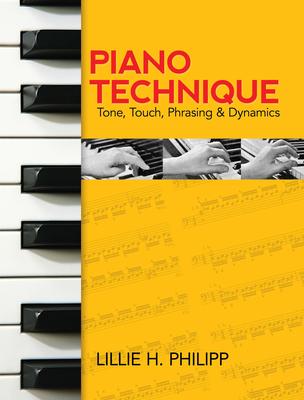Practice is indeed the soul of piano technique and this concise handbook -- by a noted pianist and teacher -- tells you how to get the most out of it. It is a working manual, containing technical studies, excerpts from the works of the great piano masters, and photographs -- all of which help the students develop a sound technique in a comparatively short time.
Beginning with such elemental topics as seating position, hand and finger positions, and scales, the author proceeds to trilling, exercises, thumb exercises, four-finger exercises, accent, tone production, chords, fingering, pedaling, phrasing, sight-reading, and other essentials of keyboard art.
Ms. Philipp has distilled the experience of a lifetime of playing and teaching (she studied with students of Liszt and Busoni) into a highly useful guide for all piano students. The text is replete with hints and suggestions for developing better technique:
Melody -- If you want a melody to sing, keep the accompanying figuration softer and you will get the desired effect.
Practice -- Practicing pianissimo, as many great pianists have been known to do, will help further technique and improve velocity.
Pedaling -- If you want an individual tone to be particularly beautiful, catch it with the pedal just after you have hit it.
These hints, and a host of others, are complemented by 63 musical excerpts from the masters -- Beethoven, Chopin, Schumann, Bartk, Mendelssohn, Liszt -- and numerous exercises illustrating various technical, stylistic, and musical approaches. Close-up photographs indicate proper positioning of hands and fingers to achieve the proper playing skills and practicing techniques.
Pianists at all levels can benefit from careful study of this unique book -- beginners will find it particularly helpful in acquiring a thorough knowledge of the essentials; intermediate and advanced pianists will appreciate its review of basic principles and the author's authentic and interesting treatment of problems concerned with the study of the piano.

Piano Technique: Tone, Touch, Phrasing and Dynamics
Practice is indeed the soul of piano technique and this concise handbook -- by a noted pianist and teacher -- tells you how to get the most out of it. It is a working manual, containing technical studies, excerpts from the works of the great piano masters, and photographs -- all of which help the students develop a sound technique in a comparatively short time.
Beginning with such elemental topics as seating position, hand and finger positions, and scales, the author proceeds to trilling, exercises, thumb exercises, four-finger exercises, accent, tone production, chords, fingering, pedaling, phrasing, sight-reading, and other essentials of keyboard art.
Ms. Philipp has distilled the experience of a lifetime of playing and teaching (she studied with students of Liszt and Busoni) into a highly useful guide for all piano students. The text is replete with hints and suggestions for developing better technique:
Melody -- If you want a melody to sing, keep the accompanying figuration softer and you will get the desired effect.
Practice -- Practicing pianissimo, as many great pianists have been known to do, will help further technique and improve velocity.
Pedaling -- If you want an individual tone to be particularly beautiful, catch it with the pedal just after you have hit it.
These hints, and a host of others, are complemented by 63 musical excerpts from the masters -- Beethoven, Chopin, Schumann, Bartk, Mendelssohn, Liszt -- and numerous exercises illustrating various technical, stylistic, and musical approaches. Close-up photographs indicate proper positioning of hands and fingers to achieve the proper playing skills and practicing techniques.
Pianists at all levels can benefit from careful study of this unique book -- beginners will find it particularly helpful in acquiring a thorough knowledge of the essentials; intermediate and advanced pianists will appreciate its review of basic principles and the author's authentic and interesting treatment of problems concerned with the study of the piano.